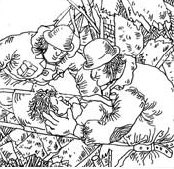According to recent media reports, Japanese Internet users "found with surprise" that hostile comments from Chinese youths against Japan had "decreased dramatically since the earthquake struck (on May 12)."
It is true.
Mostly because of historical problems, mutual distrust and even hostility on certain occasions have long existed between the common people, especially the youths, of the two countries. Thanks to both governments' efforts to break the deadlock in bilateral relations and the mutual visits by the two countries' leaders in the past two years, the ice of mutual distrust began to thaw.
The "ice-thawing" process picked up pace suddenly in the past few weeks after Japan donated money quickly to help China fight the natural disasters and sent a rescue team to the earthquake-stricken Sichuan province. The photos published on the Internet showing Japanese rescuers working on the debris and bowing heads to mourn the dead Chinese citizens moved Chinese netizens to tears. They were also touched by Tokyo-based Chinese journalists' reports that "nearly every convenience shop here has set a box collecting donations for quake victims in China."
Needless to say, the Chinese people were touched not as much by the money as by the friendly intentions thus demonstrated by the Japanese people. During the hard days of the bilateral relations, a large number of Chinese youths had directed their fury, caused by the unfriendly moves taken by Japanese right-wingers, to a large part of the Japanese society. Now, the good intentions they found in the Japanese aid helped soothe the rancor in their hearts. They found the Japanese people, on the whole, were not as hostile towards China as they had thought them to be.
For anyone who is suffering from difficulties, financial and material aid from other people is always a substantial help. What is more meaningful, however, is the love he/she perceives in the aid. This love stems from the kindness that is intrinsic in human nature. It is the most valuable feeling in human society. It makes people build up confidence in life and encourages them to love others. Allow me to use a clich, "love evokes love."

Since the earthquake inflicted great sufferings on the Chinese people, people throughout the world have sent in cash and aid materials. Our hearts were filled with gratitude when we saw professional rescue teams arriving from Japan, Russia, Singapore and the Republic of Korea; when we heard Saudi Arabia, among the earliest international donors, announce its donation of $50 million plus $10 million worth of relief materials; when we learned that Pakistan sent in all the tents the country had in reserves and refused the Chinese embassy's offer of payment; and when Peru announced May 19 to be its "national mourning day" for the Chinese earthquake victims, to cite only a few examples.
Even Mozambique's meager $40,000 donation moved us to tears. A Chinese Internet surfer wrote online: "I heard that their leader had no money traveling to New York to attend the UN meeting. Forty thousand dollars could have helped them a lot but they donated it to us. I feel so grateful to them!" The man (or a woman) cited a famous Chinese saying: "A favor the size of a drop of water should be repaid with one of the amount of a surging spring." The old saying typically represents Chinese people's culture of repaying debts of gratitude.
The love the people felt in the international aid and demonstrated in the joint battles in which the Chinese people united to fight the earthquake is an encouraging sign of a harmonious world. We need love, not hatred; we need peace, not conflicts; we need mutual understanding, not distrust. Let's all work for that aim.
E-mail: liushinan@chinadaily.com.cn
(China Daily 06/04/2008 page8)